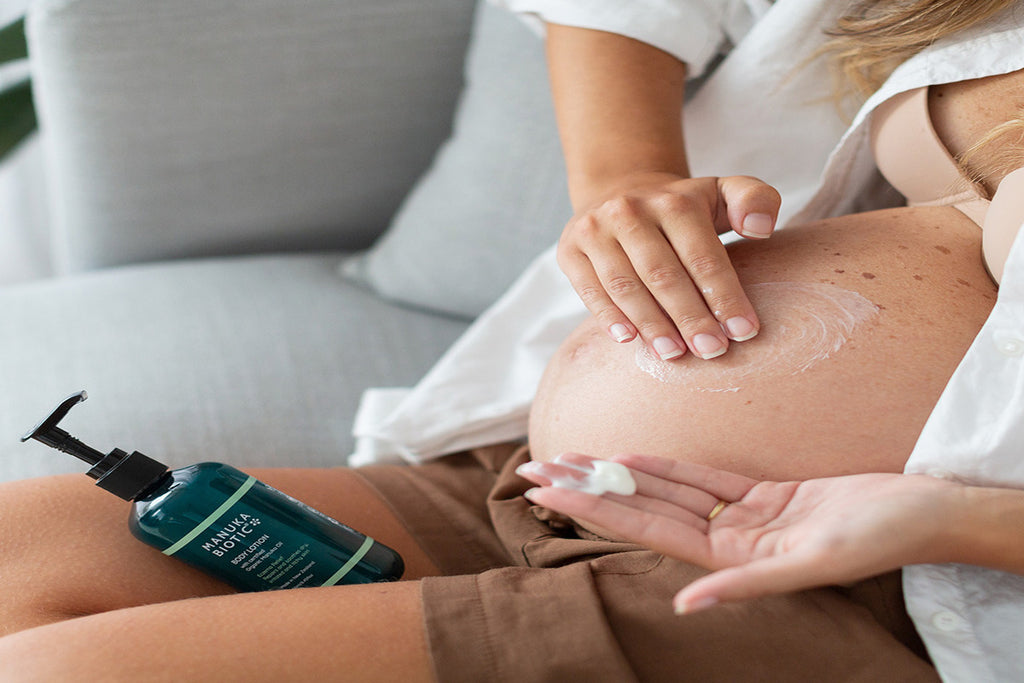Are you an expectant mom seeking soothing relief from itching skin during pregnancy? Pregnancy eczema, or Atopic Eruption of Pregnancy (AEP), is a common concern among pregnant women. Amidst the metabolic, immunlogic, and hormonal changes that your body undergoes during pregnancy, it's important not to overlook the potential onset of skin issues like a new rash or a few bump as it could be pregnancy eczema.
UNVEILING PREGNANCY SKIN CHANGES
Pregnancy triggers various physiological changes, some of which are specific to pregnancy- related skin issues. The complex interplay of factors within your body during pregnancy can lead to the development of eczema. Understanding the unique nature of pregnancy related skin problems is essential for finding relief from itching and discomfort.
DECODING ATOPIC ERUPTION OF PREGNANCY (AEP)
There are three distinctive conditions which fall under the umbrella of pregnancy eczema:
-
ATOPIC DERMATITIS (ECZEMA): Characterised by lesions that often appear during the first or second trimester. These lesions tend to manifest around the neck, ankles, or abdomen.
- PRURIGO OF PREGNANCY: This condition presents as groups of excoriated papules resembling tiny bumps, commonly found on the limbs and trunk.
- PRURITIC FOLLICULTIS OF PREGNANCY: Typically occurring in the second or third trimester, this condition is marked by erythematous follicular papules that resemble acne
TRIGGERS OF PREGNANCY ECZEMA
Much like the uniqueness of your baby's name, pregnancy eczema is as individual as the person who has it. Identifying and eliminating triggers can be a complex process. Potential irritants like soaps, fragrances, fabrics, and allergens might lead to contact dermatitis.
As a result, it can be a long and involved process to find out exactly what your triggers are and eliminate them. Some Mum's to be have contact dermatitis. Atopic dermatitis, on the other hand, involves more intricate sensitivities, such as environmental allergens, food allergies, and hormonal changes. Similarly, those wild hormones (from growing a little human) can just cause their skin to retaliate with inflammation and itching. It is essential to navigate this landscape carefully to reduce flare-ups and find effective relief.
LIKELIHOOD OF DEVELOPING AEP
Certain factors can elevate the likelihood of experiencing Atopic Eruption of Pregnancy, including a history of:
•Eczema
•Asthma
•Sensitive, easily irritated skin
•Allergic rhinitis, including hayfever and house dust mite allergies
•Food Allergies
5 SIMPLE TIPS HELPING ALLEVIATE PREGNANCY ECZEMA ?
First up, it sounds like we are pointing out the obvious but: don’t scratch! Do your best not to scratch because it can irritate your skin further and increase the risk of skin infections and damage your fragile skin. Scratching the rash makes it itch worse.
1. APPLY COLD PACKS
Put an ice pack or a cool, wet compress on itchy areas for five to 10 minutes, or until the itch fades. We all know that words cannot describe how soothing an ice-cold towel feels on inflamed skin whether its itchy, sunburnt or it’s a scorcher of a day outside – it’s heavenly! Popping your body lotion in the fridge is magic.
2. MOISTURISE DAILY
In general, expectant women should moisturise their skin about two to three times a day. It’s critical in helping to repair the skin which when you scratch it, breaks down the skin barrier not allowing the skin to hold moisture. Use a fragrance-free body lotion after you take a shower or bath using an all natural and fragrance free calming body wash.
3. TAKE AN OATMEAL BATH
You can buy commercially prepared oatmeal baths at the pharmacy or you can make your own. Oatmeal is very soothing for irritated skin. You can also mix up the oatmeal and pop it into the fridge to cool then apply it like a mask to your belly.
4. DRINK ENOUGH WATER
Water is important for healthy skin, but too much can be a bad thing. Water doesn’t directly hydrate your skin either - dry skin is not necessarily a sign you’re dehydrated. Drink an amount that keeps you well hydrated (you may need more during pregnancy).
5. WEAR LIGHT COTTON OR BAMBOO CLOTHING
Look for 100% cotton or other natural fabric alternatives, which allow the skin to breathe. Also, consider your bed sheets – we spend a lot of time sleeping against fabrics that can irritate sensitive skins.
OUR RECOMMEND SOLUTIONS FOR PREGNANCY ECZEMA
The #1 selling product for pregnancy eczema is our Body Lotion . It’s formulated with natural ingredients to help soothe and repair dry, irritated and itchy skin. It’s perfect for growing tummies and babies' sensitive skin.
WANT TO KNOW MORE?
There’s a lot you can do to relieve symptoms if your pregnancy eczema gets worse. Visit the recommended websites for more information or join a supportive private Facebook support group for additional guidance.
This is especially important now because some conditions that cause itchy skin during pregnancy can affect your baby’s well-being and require special monitoring or treatment. For example, severe itching without a rash can be a symptom of cholestasis of pregnancy.
For more in-depth knowledge about specific conditions related to pregnancy skin issues, consult your doctor.
Information displayed on this site is not a substitute for professional healthcare advice. Use of, and access to, the information on this site is subject to the terms and conditions set out in our Terms of Use.
WANT TO LEARN MORE?
|
New Zealand |
Eczema Association New Zealandhttp://eczema.org.nz This organisation has an excellent website. A full list of eczema facts, forums, blogs, education and a support line, to help improve the lives of people living with eczema. |
|
Australia |
Eczema Association Australasiahttp://eczema.org.au The leading professional organisation in Australasia providing comprehensive resources and a support line, to improve the lives of people living with eczema. |
|
United Kingdom |
The National Eczema Societyhttp://www.eczema.org Dedicated to the needs of people with eczema, dermatitis and sensitive skin, the organisation is an excellent source of support and information.
|
SOURCES
For further authoritative insight, refer to: https://www.dermcoll.edu.au/atoz/atopic-eruption-of-pregnancy/














